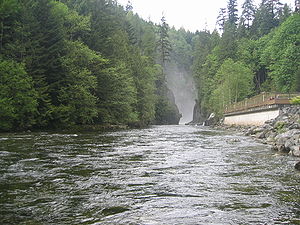
- Image via Wikipedia
I once waded out into a river where other children were happily playing. I found myself unable to go in past my knees. My legs started to feel like dead weight and it was everything I could do not to run out into the warm sun and let them dry off. But I stayed with it. I let my calves get used to the water. Then I introduced it to my waist. I stood for a long time there, breathing in shallow and quick. My belly button I then submerged and I was onto my chest. I had to crouch down in the shallow part of the river because I didn’t want to go further in. From this position, I inched toward the center of the river. I paused for minutes at a time just to make sure that my fingers were still working. I was finally able to get all of me under the water, save my head. That was the last thing I wanted to get wet. I thought that perhaps my brain would freeze and I would be stuck in the rushing water. I looked downstream, though. I saw the other kids playing and splashing and not fretting about how cold the water was. So, in the hopes that I too could join in, I dipped my head below the water. I was in. My body got used to the cold as I held my breath for a long time. When I came up, I realized that I was going to be okay. My brain wasn’t frozen. My legs worked. I could now go and play catch. I could take part. I could be happy in this water.
As I have tested the waters of my own ideas, of starting a company, of venturing further from my working past I have had moments of fear. I have found the water cold and uninviting. I have found that there is nothing to be done until I let myself come to terms with how much I have invested. As I continued to invest more and more, I become both more afraid and more emboldened to try and go further. Someday, maybe tomorrow, I will take the plunge. Someday, maybe tomorrow, I will know what it is like to feel the unfamiliar sensation of being weightless and fluid. I will hold my breath and count as everything around me acclimates and I become someone who knows what it is like to feel the free and easy sunlight on my face and make the conscious decision not to stay there.
Someday, maybe tomorrow, I will have decided that it was better to go through each and every cycle of pain and waiting to get to where I can play. I will pick up the ball and throw it to others that have done this trip too. And we will share and exchange ideas that aren’t possible on land. We will make swimming catches. We will dive down deep and see what is on the bottom. We will know every inch of this river, and we will become a part of helping others to join us.
We will say: “Come on in, the water’s fine.”




